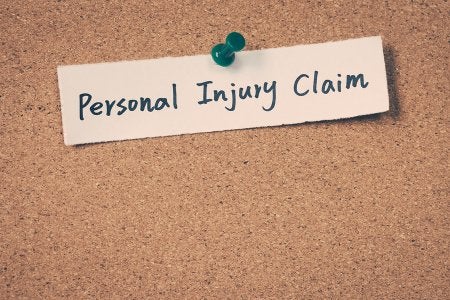-
Issue of Long-Term Injuries in Personal Injury Lawsuits
Car crashes, dog attacks, and slip and fall incidents all have at least one thing in common: The potential for long-term disability and disfigurement. If you have experienced life-changing injuries due to someone else’s negligence, you have the right to seek compensation with the help of a personal injury lawyer . An injury lawyer serving Tracy and Manteca can guide you through the process of assessing the likelihood of long-term losses and calculating future damages.

Types of Long-Term Injuries
The injuries that accidents typically cause can result in chronic pain that ranges in intensity from mild to disabling. Long-term injuries include traumatic brain injuries (TBI), severe disfigurement, and post-traumatic stress disorder (PTSD). Personal injury lawyers can seek compensation for their clients’ amputation. An amputation may be traumatic, which can happen during a serious car crash, or it may be planned. For instance, the victim of a dog attack may suffer a life-threatening infection that requires the amputation of a hand, foot, or limb. Other long-term injuries include severe disfigurement and burn injuries. Depending on the particular type of injury or disability, patients may suffer from lingering symptoms such as the following:
- Dizziness
- Tinnitus
- Headaches
- Suicidal thoughts
- Phantom pain of an amputated limb
Documentation for Long-Term Injuries
To obtain a successful outcome for your case, your injury lawyer needs as much documentation as you can provide. Your medical records will play a vital role in your case. Be sure to attend every scheduled follow-up appointment with your doctor, and fully disclose any lingering symptoms or physical deficits you’re experiencing. Keep a record of your sessions with physical or occupational therapists. As you progress toward recovery, ask your healthcare provider if there is a likelihood of a long-term impact from your injuries, such as recurrent health problems or an increased risk of degenerative problems later in life. If so, ask your doctor to make a note of it in your medical records.
Compensation for Long-Term Injuries
Long-term injuries often involve some degree of functional impairment. For example, you may suffer from reduced vision, poor mobility, or cognitive decline. Not only do these problems affect your quality of life, but they may also prevent you from working at your full capacity. Your injury lawyer might ask you to meet with a life care planner or vocational rehab expert to evaluate your long-term damages. This enables your lawyer to seek appropriate compensation on your behalf.
-
Navigating the Difficult Decision of Disinheriting a Family Member
It’s not as uncommon as you might think for individuals to disinherit family members. However, estate planning is always a tricky subject. If you do intend to disinherit someone, it’s wise to discuss this with your attorney in Tracy or Livermore. This is because estate law approaches disinheritances in different ways, depending on that person’s relation to the testator of the will.

Making the Decision
The decision to disinherit a family member is entirely yours to make. People disinherit family members for a variety of reasons. Given the prevalence of estrangement in families, disinheritance often stems from the simple fact that the testator has no relationship with the family member. Or, perhaps the disinherited family member is already financially secure and doesn’t need the inheritance as much as other family members. If you’ve decided to disinherit someone purely because you believe that person will make poor financial decisions, consider asking your lawyer to set up a trust instead.
Understanding Disinheritance Laws
As your estate planning lawyer will advise you, you do have the right to distribute your own assets in any manner you please. However, you might not have full ownership in all of your assets. If you’re married, your spouse is legally entitled to half of the marital assets. In most cases, the only way to completely disinherit a spouse is if he or she agrees to be disinherited via a legal contract. If you’re separated from your spouse, getting a divorce finalized may be a more feasible option. Estate law is more flexible regarding the disinheritance of a child. In most states, children do not have the legal right to an inheritance.
Preventing a Will Contest
If you intend to disinherit a child, you may be tempted to simply make no mention of him or her in your will. Unfortunately, this may set the stage for a will contest. The disinherited child may contest the will out of the belief that it may not be valid. Instead of simply leaving the child out of the will entirely, it’s best to specifically state that you do not intend to leave any assets to a particular person. For the sake of familial harmony after your death, it may be wise to explain your reasoning in a separate letter to be opened after your death.
-
What Exactly Is a Personal Injury Settlement?
When you consult a personal injury lawyer near Tracy or Manteca, he or she may discuss the possibility of a settlement. Your lawyer can negotiate a favorable settlement on your behalf. If you accept the settlement offer, it means that you agree not to pursue litigation in exchange for a certain sum of money. You are not legally bound to accept a settlement. If you reject the settlement offer, your personal injury lawyer can take the other party to court.
For more information about personal injury settlements, watch this brief video and consult your injury lawyer. The professional featured here explains that a personal injury settlement can compensate injury victims for their medical expenses, lost wages, and pain and suffering.
-
What Are the Responsibilities of a Will Executor?
A properly drafted will should designate a person to serve as the executor of the estate. In some cases, a will names two people to be co-executors or the document may designate an alternate executor. If you have been asked to serve in this capacity, it’s a good idea to consult a lawyer in Tracy or Manteca. An estate planning attorney can help you understand exactly what your responsibilities will be.

Filing the Will
When an individual dies, his or her will must be filed with the local probate court. The court will determine the validity of the document. The court will also need the death certificate and the petition for probate.
Notifying the Beneficiaries
The document will identify one or more beneficiaries, also known as heirs. It’s the executor’s job to locate the beneficiaries and mail notices of the probate to each of them. Likewise, you’ll need to provide notice to each of the decedent’s creditors.
Identifying and Managing Assets
During the probate process, it’s the responsibility of the executor to safeguard the estate property. You may need to open an estate bank account and obtain an IRS identification number. You’ll need to track down each of the decedent’s assets, including bank accounts, investment accounts, and real property. Prepare a complete inventory of the estate assets, including professional appraisals as necessary.
Satisfying Liabilities
It’s common for individuals to die with outstanding debts. It’s your job to identify all of these liabilities and use the estate assets to satisfy them. You’ll also need to close open accounts, such as credit cards, and cancel outstanding contracts or leases.
Distributing Assets
Once the decedent’s debts have all been satisfied, it’s time to distribute the remaining assets in accordance with the specifications of the will. First, you’ll need permission from the court to distribute the assets. Obtain and save receipts for the transfers of all of the assets. You’ll need to file these receipts when you request that the court officially release you from your duties as an executor.
-
Getting Help for Speech Problems After a Traumatic Brain Injury
Traumatic brain injuries (TBIs) can cause significant deficits across multiple areas of functioning. Patients with severe TBIs often require intensive therapy, including speech therapy. It’s important for these patients and their families to contact a lawyer in Tracy or Livermore as soon as possible. A personal injury lawyer can help families recover compensation to pay for these essential therapies.

When you watch this video, you’ll learn more about speech therapy and the importance of having an injury lawyer seek compensation on your behalf. The speech therapist interviewed here explains that the recovery process is unique to each patient; it’s difficult to predict exactly how long a patient will be in therapy. The attorney may need to consult the speech therapist regarding the patient’s anticipated future therapy needs.
-
Attaching Conditions to Inheritances
When drafting your last will and testament in the Tracy or Manteca area, you may wish to bequeath gifts to your loved ones. Unfortunately, not every heir makes wise financial decisions upon receiving an inheritance. There are ways of attaching conditions to inheritances that dissuade heirs from squandering their newly acquired assets. Talk to your attorney about this approach when you draft your last will and testament.

Your lawyer may suggest moving assets into a trust. You can then appoint a responsible trustee to distribute the assets to your heir in a fiscally prudent manner. The trustee will have the final word on whether to accept or reject the heir’s spending requests, although you can provide guidance on this matter. Another option is to establish a regular flow of money from the trust to the heir. For example, the heir could receive a certain percentage at age 18, another payment at age 21, and so on. You can even attach incentives to the inheritance. A trust may only make payments when the heir enrolls in college, graduates from college, or completes an addiction recovery program, for example.
-
Addressing the Issues of Estate Planning in a Blended Family
Every adult can benefit from seeking estate planning guidance, but for blended families, it’s particularly important to consult a will lawyer in Tracy or Livermore. Blended families pose unique challenges to estate planning. A second marriage may mean that children from the first marriage are inadvertently disinherited, for example. The situation can become even more complicated when an adult child of a blended family has multiple remarriages. Since every family’s situation is unique, it’s best to seek personalized advice from an experienced estate attorney.

Reviewing Beneficiary Designations
One suggestion your estate planning attorney may make is to review all of your beneficiary designations. Beneficiary designations are significant because not all assets pass through probate. Some, like life insurance policies, are left to the beneficiary as designated on the policy documents; the last will and testament cannot overturn this designation. If you remarry, you may wish to remove your ex-spouse as a life insurance beneficiary and instead designate your current spouse.
Itemizing Family Heirlooms
Family heirlooms and other items of sentimental value can become a point of contention in probate disputes. Children from a former marriage may feel excluded when the most recent spouse and youngest children select items they wish to keep. It’s a good idea to have a discussion with each heir about the family keepsakes that matter most to him or her. The youngest child may want the family piano, for instance, while an adult child might prefer to inherit the family history records. Listing these items and designating an heir for each when drafting the will is an effective way to curb future disputes.
Considering Premarital Agreements
There are limits as to what premarital agreements can accomplish with regard to estate planning. However, some blended families may have a concern that the long-term care needs of a new spouse may deplete the family inheritance. A premarital agreement prior to a remarriage can specify the obligations of each spouse to pay expenses and maintain insurance coverage for long-term care needs.
-
Examining the Roles of Contributory & Comparative Negligence
Personal injury cases rest on the concept of negligence. When you hire a personal injury lawyer, he or she will consider the role of negligence in your case, including whether the negligence rests solely with the other party or if you contributed to the accident in any way. If you can be proven to have a role in causing the accident, your lawyer in Tracy may adjust the kind of compensation he or she pursues on your behalf. These concepts are known as contributory and comparative negligence, depending on the laws in your state. Here is what you need to know.

Contributory Negligence
Contributory negligence is a system used in only a handful of states: Maryland, Alabama, Virginia, North Carolina, and Washington, D.C. Under this system, accident victims who were responsible for any part of an accident can be prevented receiving any compensation at all for their injuries. Even if the role of victims was very small and their injuries are severe, the contributory negligence system means that they may be full responsible for all of their own damages, including long-term financial problems caused on ongoing medical bills or the inability to work. The all-or-nothing nature of contributory negligence is the reason it is only used in a small number of states. Other states have decided that contributory negligence is too extreme and instead rely on comparative negligence.
Comparative Negligence
The comparative negligence system lets defendants in personal injury cases mount a partial defense, in which they argue that the victim has some degree of responsibility for the accident, so they should only be eligible to receive a reduced amount of compensation. Usually, this is expressed as a percentage, and the assigned percentage of responsibility is the percentage of available compensation the victim receives. In some states, including California, there is a pure comparative negligence system, in which victims can receive compensation even if they were more negligent than the defendant. In modified comparative negligence states, accident victims must be less negligent than defendants to receive damages in a personal injury case.
-
Tips for Avoiding Inheritance Disputes
Inheritance disputes are an unfortunately common part of estate settlements. They are the last thing most people want to consider happening after they pass, and fortunately, you can minimize the chances of them happening in your family with the help of a will attorney in Tracy and Livermore . Working with a will lawyer will help you do everything from reducing the burden of inheritance tax on your heirs to keeping the potential for conflict under wraps. Here is what you need to know about considering the risk of disputes and accounting for them during your estate planning process.

Reduce the Risk of Surprises
Your will is a bad place to surprise your family. If you are planning to split up your inheritance in a way that is likely to catch your family off-guard, then consider discussing your decisions with them in advance. By having the discussion when you’re in the midst of estate planning, you can explain your reasons and allow your family to express their own feelings about your decisions. Even if they ultimately don’t like the decisions you are making, they are less likely to dispute them when your will is read, since they are prepared for what is coming and have likely had a chance to come to terms with your choices.
Pick an Executor Cautiously
The executor of your will can have a big impact on how smoothly your estate settlement goes. Although many people choose their oldest child, it doesn’t have to be him or her. Review your options with the help of your lawyer and choose an executor who is honest and capable of communicating effectively with all of your heirs.
Pay Attention to Sentimental Items
Sometimes the items that are most in dispute are sentimental things rather than money or property. Some people avoid conflicts over these things by distributing things while they are still alive. If you prefer to include things like family heirlooms in the will, consider attaching short explanations of the way you are splitting things in your will as well. Remember to be as specific as possible over who gets what, so that your wishes aren’t open to interpretation.
-
Emotional Suffering Cases: Understanding Your Rights
If you were injured as a result of the negligent or reckless actions of another person, you may have the grounds for a personal injury lawsuit. Consider talking to a personal injury lawyer near Tracy or Manteca about your legal rights and options. Depending on the circumstances of your case, your personal injury lawyer might pursue compensation on your behalf for your actual losses and your pain and suffering, which may be referred to as your emotional injuries.

Examples of Emotional Injury Cases
Emotional distress can arise from many different types of personal injury cases. It may be an element in auto accident cases in which the victim has suffered mental anxiety along with physical injuries. Emotional damages can be associated with intentional torts, in which the defendant intentionally assaulted the victim. Emotional injuries may also arise from dog bite cases or slip and fall accidents.
Elements of Emotional Injuries
When determining whether to pursue compensation for emotional injuries, your personal injury lawyer will consider whether certain elements are present in your case. Under California case law, the defendant must be shown to have acted in an extreme manner that is outside of the scope of exercising reasonable care. The defendant must have acted in a way that showed reckless disregard for the victim’s safety or the defendant must have intentionally acted in this way. Additionally, the plaintiff must be shown to have suffered from severe emotional distress. The defendant’s actions must be a substantial factor in causing this extreme emotional distress.
Proof of Emotional Injuries
Emotional injuries are often difficult to prove, but there are ways that your injury lawyer can demonstrate your emotional distress. After an incident occurs, it’s important to keep careful track of all problems that stem from the incident. Perhaps your emotional distress was severe enough to cause you to miss work or even to get fired. Perhaps you had to work with a psychologist or other mental health counselor. Document the specific symptoms and other challenges you experience from day to day and describe the way in which these problems interfered with your daily life. Your account of your emotional distress should be supported by documents or testimony from your doctor or mental health professional.
RECENT POSTS
categories
- Uncategorized
- Personal Injury
- Estate Planning
- customer reviews
- Financial Planning
- Work Injury
- Tracy Lawyer
- Attorney
- Dog Bites
- Auto Accident
- Slip and Fall
- Car Accident
- Living Trusts
- Trust Administration
- Living Will
- Wrongful Death
- Probate
- advanced health care directive
- About Us
- Russian linguist
- Infographic
- Wills and Trusts
- Will
- Car Crash
- Executor
- Whiplash Injuries
- Estate Taxes
- Slip and Fall Injury
- Auto Accident Claims
- Intestate Succession
- Disinheritance
- Trust Administrators
- Cycle Accident
- Accident
